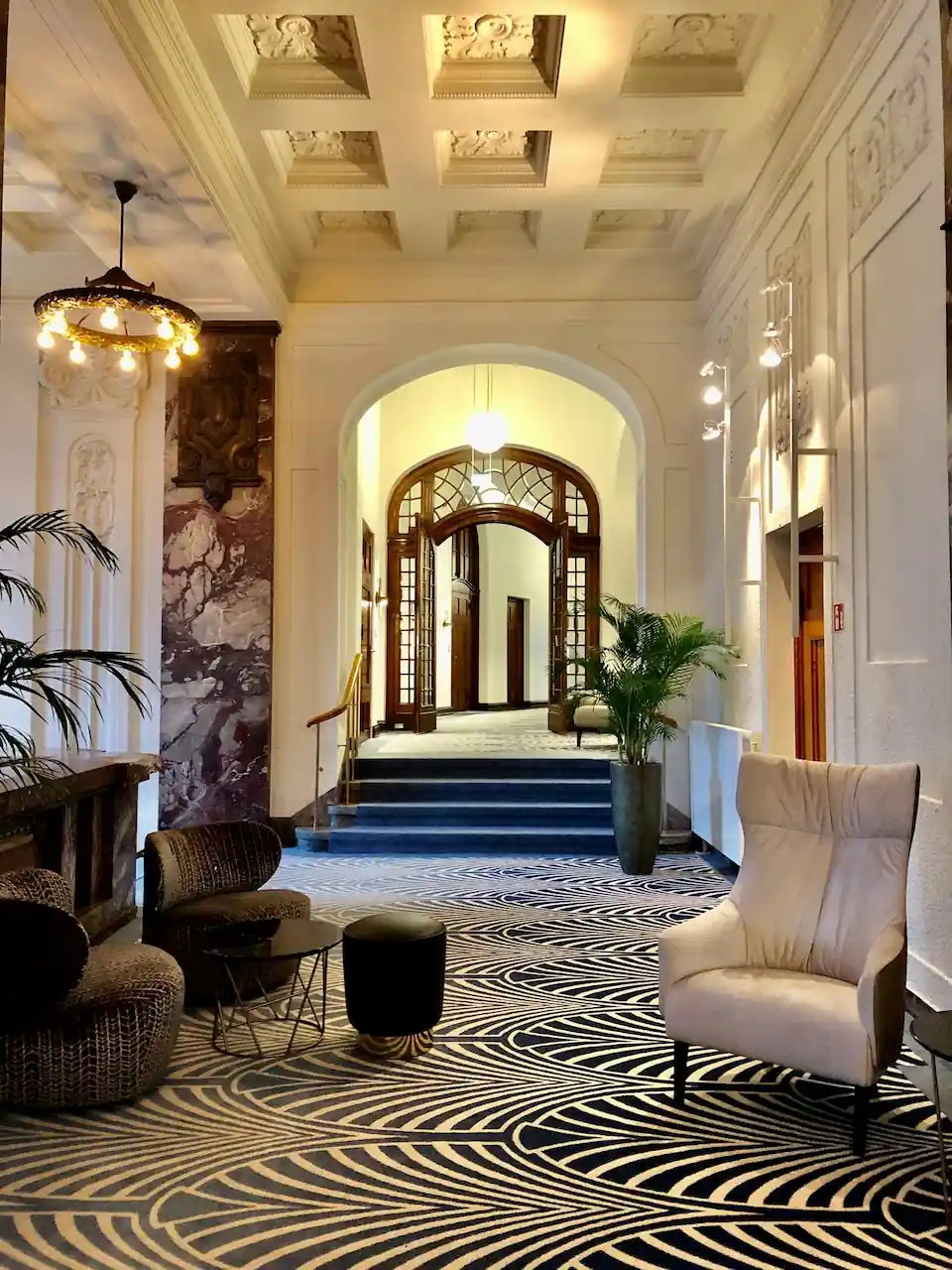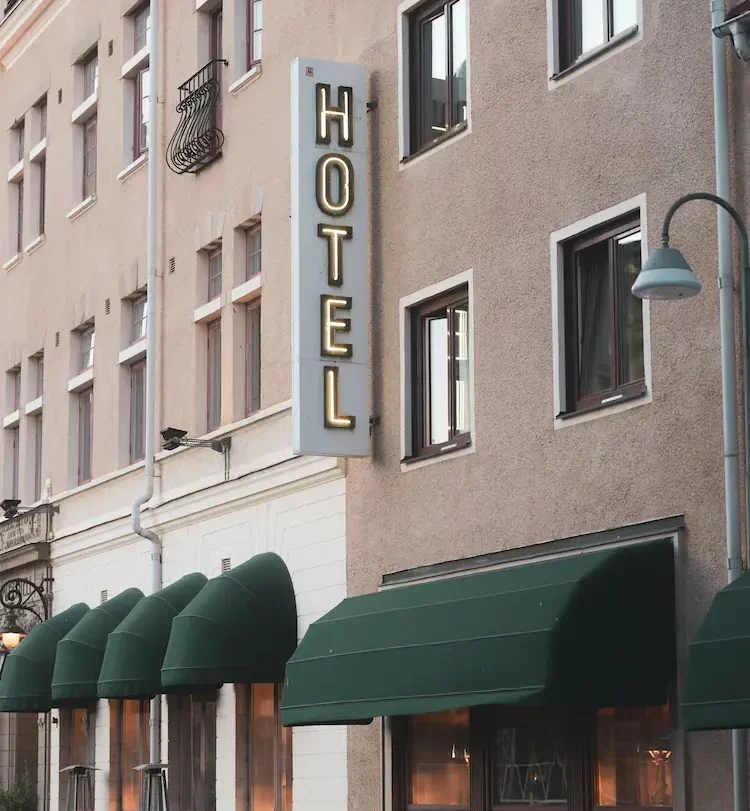PMS systems: A clear picture of what works
Are you still managing your business with post-it notes and spreadsheets? It will cost you money - every day. A powerful Property Management System (PMS) can take your business from the bottom to the top, but with many options on the market, it can feel impossible to choose the right one.
Here you will find answers to:
- Which features actually matter depending on the size of your organisation
- How suppliers charge (including the hidden fees that suppliers do not always mention)
- How to avoid common mistakes that lead to ROI on investment
- Clear steps to match your needs with the right system
Key features of the best PMS systems
- Leading PMS systems are data-driven and user-friendly
- Key tools include real-time updates and mobile access
- Different systems offer specific functions adapted to different activities
What characterises the leading PMS?
Key features to look for in the best PMS systems
The most advanced PMS systems have features that combine automation and technological integration. Those that stand out offer real-time updates, mobile access and automated guest communication.
The guest experience is more important today than ever before. Mobile check-in, automated communication before, during and after the stay, and easy payment systems are now essential features. Choosing a PMS system with a strong focus on user-friendliness can be crucial. Not only for your own staff, but also for the guest experience, in booking systems, guest portals and communication tools.
Common features of management systems
The best PMS systems share several common features. Interactive calendars, booking management and integrated channel managers are often standard today. Real-time reporting ensures that operations run smoothly without unnecessary interruptions.
One of the most crucial factors is scalability. The best systems are customisable for everything from small guesthouses to large hotel chains, making it easy to grow without having to change systems.
How these features meet industry needs
Automation is crucial for today's market. A PMS system reduces human error by automating repetitive tasks. In addition, integration with payment solutions and booking channels enables smoother management.
As technology continues to evolve, the best PMS solutions adapt to guests' needs and improve service quality. Keeping up to date with the latest trends is crucial to stay competitive.
Explore more about the latest features of PMS systems.
Specialised functions in different PMS systems
Unique tools customised for different businesses
Each PMS has its own strengths and features that suit different types of businesses. Some systems are better suited to managing hostels and smaller boutique hotels, for example, while others are aimed more at innovative hotels that want flexible payment solutions. Some systems are developed for large hotel chains and offer extensive integrations with third-party services. This variety allows businesses to find a solution tailored to their needs, which in turn improves both operational efficiency and service quality.
Delve deeper:
How specialised functions benefit different activities
Using automation in your PMS offers significant benefits. By automating routine tasks, businesses can streamline their processes, reduce manual errors and free up time for staff to focus on more value-adding activities. For example, automated systems can handle booking confirmations, payment reminders and availability updates in real time, improving both internal efficiency and the customer experience.
For more information on how automation can be integrated into PMS, visit our page on Automations in PMS systems.
Modular Visits PMS offers several features to automate daily tasks. The system can automatically create and assign tasks to staff based on specific events, such as when a guest requests an extra bed or orders room service. In addition, the system automatically manages payment flows, including charging credit cards from external booking channels at predetermined times, reducing the need for manual labour and ensuring accurate transactions. Automated handling of no-shows is another benefit, where the system can charge for the first night and free the room for new bookings without manual intervention. These automation features contribute to a smoother operation and increased profitability of the business.
A high level of customisation reduces operational challenges and improves the guest experience. Businesses can also use these features to adapt to new market trends, such as the increased need for long-term accommodation for digital nomads with customised amenities.
Examples of how these features are used in the Modular visits platform
Modular Visit's PMS platform offers a range of customised features that streamline hotel and property management operations. By integrating PMS and CRM, hotels get a complete overview of their guests, enabling personalised services and efficient follow-up. For example, a luxury hotel can use this feature to automatically record a guest's preferences, such as room temperature or favourite drink, creating a more tailored experience with each visit.
Automated customer communication is another important aspect that Modular Visit offers. For example, the system can send reminders of booked spa treatments or restaurant reservations directly to the guest's phone. For businesses running holiday resorts, this means smoother communication between different departments and a better guest experience.
To simplify financial management, the platform enables smooth payment processing through an integrated POS solution. A boutique hotel with both a restaurant and a spa can easily manage transactions between departments without the guest having to pay separately. All payments are synchronised in real time, reducing the risk of errors and making financial monitoring more efficient.
Guest self-service is a feature that has become increasingly popular, especially for hotels looking to reduce staff workload and increase convenience for guests. By offering digital check-in and check-out, a business hotel can ensure that business travellers can quickly and seamlessly manage their stay without having to queue at the front desk. Guests can also add extra services via an app, improving service and creating more revenue opportunities.
Another valuable feature is automated no-show management, where the system can identify and handle no-shows without manual intervention. For example, a city hotel with high demand can automatically cancel the remaining nights of a no-show guest and immediately free the room for a new booking. This optimises both occupancy and revenue.
Delve deeper:
- Behind the scenes: How the best hotels use PMS systems
- Hidden gems in PMS features: What no one else tells you
Modular Visit's platform streamlines staff workflows through task automation. The system can automatically generate tasks based on specific events. For example:
- If a guest books an extra bed, the cleaning staff is immediately tasked with placing it in the room.
- Additional services and upselling: when a guest orders additional services such as flowers or champagne in the room, the relevant details are automatically assigned to the staff responsible for preparing for the guest's arrival.
- Recurring tasks can be created automatically. For example, smoke alarms should be checked monthly or the lawn should be mowed weekly.
Tasks can also be marked as urgent to signal priority to the recipient.
Before comparing the leading PMS systems, it might be useful to have a basic understanding of how they work. Read more in our guide Understanding PMS systems.
2 Advantages of PMS systems
- Reduce manual errors and increase efficiency
- Seamless integration with existing tools
- Better data for smarter business decisions
2.1 Benefits of modern PMS solutions
Streamlining and time saving
Modern Property Management Systems (PMS, or booking systems) make a big difference by automating time-consuming tasks. They reduce manual errors and streamline workflows. For example, check-in and check-out take just a few seconds with automated systems, saving valuable time for both staff and guests.
The integration of artificial intelligence into PMS also allows problems to be solved faster. The system analyses patterns, anticipates potential problems and deals with them before they even occur.
For companies with multiple hotels, it is particularly important to be able to manage everything from a single platform. This simplifies administration, reduces the need for extra staff and frees up resources to focus on core business. Read more about the benefits of PMS in hotels and how different organisations can benefit from these technologies.
Integration with existing business tools
PMS systems are designed to integrate easily with a variety of business tools. This allows data to flow smoothly between different systems without having to be manually managed. For example, booking systems, WBE, CRM tools and PMS can work together to provide a more complete picture of the business in real time.
This type of integration is particularly valuable for departments that rely on accurate data. Marketing teams can use the information for targeted campaigns, while the finance department can streamline invoicing and accounting. This synergy increases both productivity and customer service, helping companies achieve their business goals. For those considering implementing a PMS system, it may be worth reading about the benefits of cloud-based PMS solutions.
At Modular Visit, we have taken a different direction compared to many other booking system providers. Our software offers all systems in a single platform. Instead of creating and maintaining integrations between several different systems, everything interacts in real time and the data is only in one place and in one platform.
WBE PMS Self-service Dialogue Analyses POS
All online bookings are managed in the same platform as the PMS. A single true source for your data.
A powerful platform that combines your PMS, WBE, POS, CRM and channel manager. All systems and data in one place.
Checking in and out, making payments, updating information, adding extra services. Everything is easily managed by the guest.
Improve your guest communication. Information, reminders, suggestions for extra services and marketing. All easily automated in our powerful communication suite.
Reporting tools with great flexibility to create the reports and statistics you need.
Payments on site, online payments. Card, Swish, bank transfer, Apple Pay, etc. All included.
A platform.
For all systems.
Online booking in your PMS.
All online bookings are managed in the same platform as the PMS. A single true source for your data.
All in one place.
A powerful platform that combines your PMS, WBE, POS, CRM and channel manager. All systems and data in one place.
Let the guests help themselves.
Checking in and out, making payments, updating information, adding extra services. Everything is easily managed by the guest.
Communication that engages.
Improve your guest communication. Information, reminders, suggestions for extra services and marketing. All easily automated in our powerful communication suite.
Get insights from your data.
Reporting tools with great flexibility to create the reports and statistics you need.
All types of payments.
Payments on site, online payments. Card, Swish, bank transfer, Apple Pay, etc. All included.
Improved data accuracy and analysis
Accurate data is crucial for making informed decisions. PMS systems collect, process and present data with high precision. This means that reports on occupancy, billing and guest preferences are accurate and reliable. By using accurate data, hoteliers can optimise resources and improve the guest experience.
Another major advantage is the possibility of in-depth analyses. PMS systems can generate reports that help identify trends, forecast demand and manage revenue. The ability to analyse both historical and future data gives companies a competitive advantage. Leaders can make strategic decisions based on concrete facts instead of gut feelings or outdated reports. For those who want to keep up to date with the latest changes in data technology, you may be interested in read more about the latest changes in PMS automation.
2.2 Choosing the right PMS for your business
Which companies benefit most from specific features?
Not all businesses have the same need for PMS features. Hotels with many international guests can benefit greatly from multilingual support and currency conversion. In contrast, boutique hotels may prioritise advanced analytics to create a more personalised guest experience. Customising PMS features to the unique needs of your business will ensure that your investment delivers the desired results.
Different industries can benefit from PMS features in different ways. Venues organising conferences may need powerful event management tools. Holiday rental companies, on the other hand, may value strong channel manager integrations with OTAs and smart pricing tools. Understanding these differences will help companies choose a system that fits their specific requirements.
How companies measure the value of a PMS implementation
The return on a PMS investment is not just about cost savings. It is also about measurable improvements in workflows and customer satisfaction. Key performance indicators (KPIs) can include shorter check-in times, higher guest ratings and better room occupancy. Some companies also see reduced labour costs as automation takes over many tasks.
Evaluating the impact of a PMS implementation step by step can be a good strategy. The first step is to analyse installation and training costs. Then you can measure operational changes and any improvements in guest service. In the long term, you can evaluate whether the system is contributing to the growth and profitability of your business.
Aligning PMS features with business objectives
PMS solutions should support both short-term and long-term business goals. For example, hotels planning rapid expansion may need a system with high scalability. Companies looking to improve the customer experience may instead prioritise CRM integration. The ability to create customised reports can be crucial to focus on the right performance metrics.
A well thought-out strategy starts with defining the company's objectives. It then identifies PMS capabilities that support these goals. Setting clear criteria for success ensures that the technology investment is relevant and profitable.
By carefully matching PMS features with business objectives, companies can take full advantage of their system. This lays the foundation for more cost-effective operations and long-term growth.
8 tips for choosing the right PMS
Choose a cloud-based PMS for better scalability, remote access and automatic updates.
Ensure that the PMS has seamless integration with OTAs and direct booking engines to maximise occupancy.
Look for dynamic pricing tools that adjust prices based on demand, season and competitor prices. Often this is an integration to an external platform.
Choose a PMS with CRM features to track guest preferences and increase repeat bookings.
A mobile-friendly PMS allows staff to manage operations from anywhere, increasing efficiency.
Advanced reporting tools help you track revenue, occupancy trends and profitability in real time.
Secure and smooth payment processing speeds up transactions and reduces the risk of errors.
Automate task distribution and get real-time updates to improve turnaround times.
3. cost comparison of PMS systems
Analysing the costs of Property Management Systems (PMS) can be a challenge. Here we review the most common pricing models and advise on how to get the best value for money.
The pricing of Property Management Systems (PMS) varies depending on the provider and the needs of the business. Many PMS vendors use a combination of different pricing models, making it important for businesses to understand the potential costs before choosing a system. Below are some of the most common pricing methods:
- Monthly fee - A fixed monthly cost for using the system, regardless of the number of users or properties.
- Additional fee per user - Additional cost for each additional user accessing the system.
- Surcharge per establishment - If the business has more than one unit (e.g. hotel, campsite or hostel), a fee may apply per establishment.
- Monthly cost per room - Pricing based on the number of rooms or accommodation units within the organisation.
- Turnover-based model (PMS) - A percentage charge on all booking turnover processed through the PMS system.
- Turnover-based model in WBE - A percentage fee on bookings made via the online booking engine.
- Additional fee for channel manager - Extra cost to synchronise bookings with different distribution channels.
- Additional fee per OTA in channel manager - Some systems charge a fee per integrated online travel agency (OTA), such as Booking.com or Expedia.
- Surcharge for specific functions - Extra cost for advanced features such as automation, revenue management or AI-driven pricing.
- Surcharge for integrations - Many providers charge extra for integrations with related systems, such as CRM, POS or accounting software.
- Transaction fee on payments - Fee for payments processed through the PMS, often a combination of a fixed fee and a percentage of the amount.
- POS fee - Additional cost for POS systems and payment terminals if these are part of the offer.
- Fee on physical payments - Some providers charge a fee for payments made via physical tills and payment terminals.
- Fee for sending SMS messages - Cost per SMS sent to guests via the system, e.g. booking confirmations or reminders.
In addition to these, some PMS providers may offer customised pricing models, with larger organisations negotiating individual packages. Others may charge for support and training beyond the basic licence.
Choosing the right pricing model is about understanding how the different cost components affect the profitability and budget of the business. Businesses should compare different suppliers, identify the features they need and calculate the total cost before making their choice.
3.2 Balance between cost and functionality
Paying less is not synonymous with saving money in the long run. It's about managing spending in a way that maximises returns.
Maximise your ROI
Successful companies show that it pays to focus on the investments that deliver the greatest impact. Regular evaluations and optimisation of technology ensure high efficiency. In addition, a well thought-out negotiation strategy can help reduce costs.
Practical tips
- Do your research: understand market prices and what features you really need.
- Build a good relationship with your supplier through an open and clear dialogue.
- Bundle your needs into a package deal - it can offer better value and flexibility.
- Keep track of suppliers' contract cycles to negotiate at the right time.
Guests today have higher expectations. Let us show you how we can take your business to the next level.
Future trends in PMS
Emerging technologies shaping PMS
Increasing importance of mobile and remote access
Mobile and remote access are crucial features of PMS systems. Demand for systems that can be managed remotely is high, as companies strive for greater flexibility. Some systems offer seamless mobile access, which made management easier for managers and employees. However, far from all systems do, many hotels still use legacy on premise systems (PMS installed on hardware located in the specific hotel).
Companies should ensure that the PMS they choose not only supports, but also excels in mobile and remote functionality. This means ensuring compatibility with different devices and training staff on how to fully utilise these features. In a world where technology enables increased mobility, a lack of such features can lead to inefficient processes and lower customer satisfaction.
Focus on user-friendly interfaces
User-friendly interfaces have become a cornerstone of PMS design, prioritising simplicity. Recently, vendors have focused on intuitive systems that reduce staff training time and improve interaction with the system. However, many of the older systems are struggling to make the shift to more user-friendly interfaces, as they are often backed into a corner with more complex interfaces that affect large parts of the software design.
User-friendly interfaces can be directly linked to ROI as hospitality is an industry with high staff turnover and a lot of time is spent on onboarding and training new staff. Organisations that have complex, difficult-to-navigate systems also often see a much higher level of errors created by staff. By choosing a modern PMS with a simple, user-friendly interface, you will save directly on labour costs as your new staff will become self-sufficient much faster.
Preparing for future changes
How companies can stay ahead by adapting to new technologies
To stay ahead, businesses should regularly review whether they need to update their PMS system to include the latest innovations. This means integrating features that streamline operations and improve the guest experience. AI and machine learning will continue to redefine efficiency, making continuous development and customisation a crucial factor.
Investing in research and development and having a flexible IT department can help companies anticipate and quickly adapt to new technological changes. By collaborating with experts and testing new PMS features in controlled environments, companies can ensure a smooth transition without disrupting daily operations.
Training and development opportunities for future PMS use
Keeping up with the rapid changes in PMS technology requires a well-trained workforce. Companies that provided ongoing training and skills development were able to adapt and implement new technologies more quickly. This trend will continue, making structured training programmes increasingly important.
Companies should develop comprehensive training modules that cover the technical nuances of PMS systems. These programmes should be updated regularly to reflect the latest system features and changes. Well-trained staff are more likely to utilise the full potential of the system, increasing both productivity and customer service.
Investing in employees' skills development means that they not only use new features but also do so effectively. This investment in training creates a culture of continuous learning and innovation, which strengthens the company's position in an increasingly digitised industry.
Steps to future-proof your choice of PMS system
Choosing a PMS system that is fit for the future is crucial. It has become clear that companies that invested in scalability and integration were able to extend the life of their systems and increase efficiency. Future-proofing your PMS means choosing systems that are flexible and can integrate new technologies seamlessly.
As technologies are constantly evolving, systems should offer modular upgrades without disrupting basic functions. Therefore, companies should partner with vendors who have clear plans for future technology development and system updates. This strategy minimises the need for costly and time-consuming PMS system replacements.
By choosing a PMS with these characteristics, companies not only ensure that they meet their current needs, but also that they are equipped for the demands of the future. The coming year is expected to bring even more technological advances, making future-proofing a key part of the PMS strategy.
Preparing for the future requires thoughtful decisions and a willingness to adapt and grow. As technology evolves, businesses that are well-informed and flexible will be the ones to lead the way and maintain their competitiveness.
- Requires physical servers and local IT infrastructure.
- High initial investment costs for hardware and installation.
- Restricted access - can only be used on site.
- Updates and maintenance must be handled manually by IT staff.
- Security risks as older systems often lack modern safeguards.
- Often difficult to integrate with other systems, creating inefficient workflows.
- Data is at risk of being lost in case of server failure without a proper backup solution.
- Scaling up is costly and requires additional hardware investments.
- Limited backup and recovery options, increasing the risk of data loss in the event of a system crash.
- Slower pace of innovation - more difficult to implement new features and updates compared to cloud-based systems.
- Accessible from any device with an internet connection.
- Lower initial costs - usually subscription-based solutions.
- Automatic updates and security upgrades without downtime.
- High security with encryption, GDPR compliance and real-time backups.
- Easy to integrate with other systems such as CRM, booking engines and payment solutions.
- Scalable - hotels can easily add more rooms, locations or features if needed.
- Real-time data and analytics for better business decisions and optimised revenue management.
- Reduced need for local IT staff and technical maintenance.
- Faster implementation and shorter learning curve for staff.
Conclusion
PMS have evolved significantly in 2025. The best systems now combine data analytics, automation and cloud technology to meet complex business needs. Our research shows that successful PMS implementations rely on careful planning and a clear link to business objectives.
Cost structures vary widely between providers, but ROI analyses show that companies that match their needs with the right capabilities see positive results.
Going forward, artificial intelligence and remote access will be the main drivers of PMS development. For business owners and decision makers who choose PMS systems today, the focus should be on:
- Choosing systems with strong mobile capabilities
- Ensuring seamless integration with existing tools, or platforms that offer multiple systems in the same solution.
- Prioritising user-friendly interfaces for smooth staff customisation
- Planning for scalability as business needs change
The choice of PMS system is a crucial factor in the success of a business. It affects daily operations, staff productivity and business growth. Take the time to evaluate the options, test the systems thoroughly and choose a solution that both fulfils current needs and allows for future expansion.
To succeed in the future, it is important to choose the right technological solutions today.







